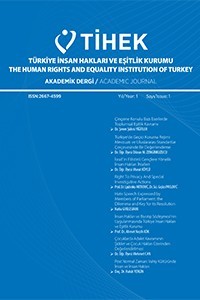Amerikan Yüksek Mahkemesi Perspektifinde Yanlış İfadelerin Anayasal Koruması
Otonom birey kavramı üzerine inşa edilen modern devletin, bu otonominin gerçekleşmesi için sahip olması gereken en önemli niteliklerinden biri, bireylerin ifade özgürlüğünü garanti altına almış olmasıdır. İfade özgürlüğü aynı zamanda bir devlete, bir topluma ya da herhangi bir topluluğa demokratik sıfatını bahşeden en önemli kurumdur. Bu sebeple kendisini bir hukuk devleti olarak tanımlayan her hukuk sistemi ifade özgürlüğüne ilişkin somut düzenlemelere sahiptir. Bu düzenlemeler, temel felsefesi itibariyle ortak değerlere dayansa da birbirinden farklılaşan yönleri ihtiva etmektedir. Amacımız, söz konusu farklılıklardan biri olarak yanlış ifadelerin (false speech) ifade özgürlüğü kapsamında korunması hususunu ele almaktır. Amerikan hukuk sisteminde anayasal bir problem olarak kabul edilen false speech teorisi, kavramsal olarak Kıta Avrupası hukuk sistemine yabancıdır. Bu çalışmada Amerikan hukukunda ifade özgürlüğüne ilişkin genel bilgilere değinildikten sonra yanlış ve yalan ifadelerin bu korumadan yararlanması meselesi değerlendirilecektir. Bu amaçla konu ile ilgili Amerikan Yüksek Mahkemesinin en net tespitlerini içeren ve 2012 yılında verilmiş U.S. v. Alvarez kararı tahlil edilecektir. Son olarak, ifade özgürlüğü açısından kendine özgü özelliklerinin anlaşılması için Amerikan ile Kıta Avrupası hukuk sisteminin genel bir karşılaştırması yapılacaktır.
Anahtar Kelimeler:
İfade özgürlüğü, Yanlış ifade, Amerikan Yüksek Mahkemesi
Constitutional Protection of False Speech in the Perspective of the American Supreme Court
One of the most important characteristics of the modern state, which is built on the concept of the autonomous individual, is the freedom of expression to be guaranteed. Freedom of expression is also the most important institution that confers the democratic feature on a state, society or any community. For this reason, every legal system that defines itself as a rule of law has concrete regulations regarding freedom of expression. Although these regulations are based on common values in terms of their basic philosophy, they contain aspects that differ from each other. We aim to discuss the protection of false speech as one of these differences within the scope of freedom of expression. The false speech theory, which is seen as a constitutional problem in the American legal system, is conceptually alien to Continental law. In this study, after mentioning the general information on freedom of expression in American law, the issue of protection of false speech will be evaluated. For this reason, the U.S. v. Alvarez, which is one of the most important decisions of the U.S. Supreme Court held in 2012 will be analyzed. Finally, a general comparison will be made between the American and the European system to understand uniqueness of American free speech doctrine.
Keywords:
Freedom of expression, False speech, U.S. Supreme Court,
___
- Centel, N. (2001) Cezanın Amacı ve Belirlenmesi, Turhan Tufan Yüce’ye Armağan, İzmir, Dokuz Eylül Üniversitesi Yayınları, 337-372.
- Chemerinsky, E. (2018) Keynote Address: Fake News, Weaponized Defamation and The First Amendment, Southwestern Law Review, Vol. 47, 1-15.
- Druzin, B. H./Li, J. (2017) Yalan Söyleme Eyleminin Suç Olarak Öngörülmesi: Eğer Mümkün İse Hangi Şartlar Altında Yalan Söylemek Suç Olarak Öngörülebilir? (Çev. Nagehan Kırkbeşoğlu), Küresel Bakış, Yıl:8, Sayı:23, 1-50.
- Federal Alman Cumhuriyeti Anayasası, 27.09.2021 tarihinde https://www.btg-bestellservice.de/pdf/80207000.pdf adresinden alınmıştır.
- Finnegan, B. (2021) The Cost of Free Speech: Combating Fake News or Upholding the First Amendment? University of Miami Law Review, Vol 75, No 2, 572-619.
- Guzelian, C. P. (2010) True and False Speech, Boston College of Law, Vol. 51, 669-718.
- Heller, B./ van Hoboken J. (2019) Freedom of Expression: A Comparative Summary of United States and European Law, Translantic Working Group, 18 Eylül 2021 tarihinde https://www.ivir.nl/publicaties/download/TWG_Freedom_of_Expression.pdf adresinden alınmıştır.
- Hudson, D. L. Jr. Content Neutral, 16 Eylül 2021 tarihinde The First Amendment Encyclopedia: https://www.mtsu.edu/first-amendment/article/937/content-neutral adresinden alınmıştır.
- Killion, L. V. (2019) The First Amendment: Categories of Speech, Congressional Research Service Reports, 16 Eylül 2021 tarihinde Congressional Research Service (CRS): https://crsreports.congress.gov/product/pdf/IF/IF11072 adresinden alınmıştır.
- Kontoğlu, S. (2018) Alman Sosyal Medya Kanunu, Küresel Bakış, Yıl:8, Sayı:24, 143-150.
- Kraski, R. (2017) Combating Fake News In Social Media: U.S. and German Legal Approaches, Vol. 91, No. 4, 923-955.
- Mill, J. S. (2003) Hürriyet Üstüne, Çev. Mehmet Osman Dostel, Liberal Düşünce Topluluğu, Ankara.
- Özbey, Ö. (2013) Avrupa İnsan Hakları Sözleşmesi Işığında İfade Özgürlüğü Kısıtlamaları, TBB Dergisi, No. 106, 41-92.
- Özsoy, Ş. (2005) Amerika Birleşik Devletleri Hukukunda Düşünceyi Açıklama Hakkına İlişkin Standartlar, TBB Dergisi, Sayı 56, 29-47.
- Sunstein, C. R. (2020) Falsehoods and The First Amendment, Harward Journal of Law and Technology, Vol 33, No 2, s. 396-405.
- White, E. G. (2019) Falsity and First Amendment, SMU Law Review, Vol. 72. Issue 3, 513-534.
- Yüksel, İ. (2019) Amerika Birleşik Devletleri Yüksek Mahkemesi İçtihatlarında Nefret Söylemi, Inonu University Law Review,10(2): 438-451.
- Mahkeme Kararları
- Chaplinsky v. New Hampshire, 315 U.S. 568 (1942), Justia US Supreme Court, 5 Eylül 2021 tarihinde https://supreme.justia.com/cases/federal/us/315/568/ adresinden alınmıştır.
- New York Times Co. V. Sullivan, 376 U.S. 254 (1964), Justia US Supreme Court, 5 Eylül 2021 tarihinde https://supreme.justia.com/cases/federal/us/376/254/ adresinden alınmıştır.
- United States, Petitioner v. Xavier Alvarez, 567 U.S. 709 (2012), Justia US Supreme Court, 1 Eylül 2021 tarihinde https://www.supremecourt.gov/opinions/boundvolumes/567BV.pdf adresinden alınmıştır.
- Virginia v. Black, 538 U.S. 343 (2003), Justia US Supreme Court, 5 Eylül 2021 tarihinde https://supreme.justia.com/cases/federal/us/538/343/ adresinden alınmıştır.
- ISSN: 2667-4599
- Başlangıç: 2018
- Yayıncı: Türkiye İnsan Hakları ve Eşitlik Kurumu
Sayıdaki Diğer Makaleler
Meşru Müdafaa Üzerine Kurulu Bir Cemaat Örneği: “36 Boys”
İnsan Hakları Eylem Planı Sonrası İl ve İlçe İnsan Hakları Kurullarının Geleceği
Tanrı, Yeni Doğal Hukuk Kuramı ve İnsan Hakları
Amerikan Yüksek Mahkemesi Perspektifinde Yanlış İfadelerin Anayasal Koruması
İnsan Haklarının Kurumsallaşması: Ulusal İnsan Hakları Kurumları
Türkiye Cumhuriyeti Anayasa Mahkemesi'nin "Katı Yorum" İçtihadı ve Anayasaya Uygun Yorum
